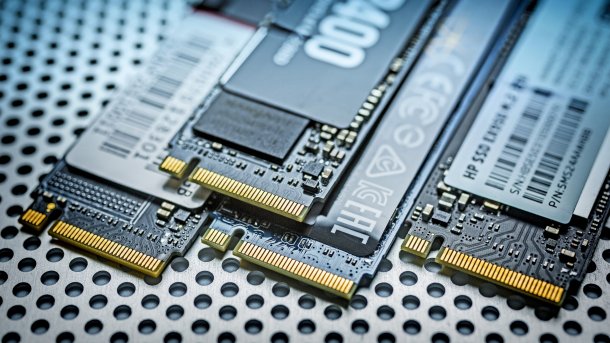SSD demand explodes due to AI server
Sales of enterprise SSDs are estimated to have risen by 80 percent within nine months. This could have an impact on client SSDs.

M.2 SSDs for desktop PCs and notebooks often contain the same memory components as server SSDs.
(Image: c't)
Manufacturers of flash memory chips and SSDs are rejoicing: The AI boom is helping to further overcome last year's low in demand. Market observer Trendforce estimates that data center operators will buy around 80% more enterprise SSDs in the third quarter of 2024 than at the end of 2023.
Over the whole of 2024, they could buy SSDs with a total capacity of more than 45 exabytes. Models with a capacity of 4 and 8 TByte whose NAND flash components store three bits per cell (triple level cells, TLC) are expected to be particularly popular. 45 exabytes would correspond to more than 11 million 4-TByte SSDs.
Price increases possible
TLC memory is also the most widely used in M.2 client SSDs. Manufacturers could shift some of their production from such models to enterprise SSDs, which would potentially lead to price increases. In June, Trendforce was still forecasting price increases of three to eight percent for client SSDs in the current quarter.
On the positive side, memory manufacturers such as Samsung, Western Digital, Kioxia, SK Hynix and Micron are motivated to upgrade their semiconductor plants. The switch to new chip generations with more than 200 memory layers should also be faster.
In AI servers, for example, companies store the material for training AI models on SSDs. They also save countless intermediate versions of the models. Responsive data carriers help with training, which is why HDDs play a subordinate role here.
Videos by heise
Stabilization in German stores
In German retail, SSD prices have risen significantly for around six months since autumn 2023, but have since stabilized again. Popular models have also become slightly cheaper again since the summer.
Some 1 TB SSDs are available for less than 60 euros, including the popular Kingston NV2 (starting from 169,90 €) and Lexar NM620 (starting from 125,99 €). Models with 2 TByte capacity start at 100 euros, including Lexar's NM620 (starting from 228,99 €). If you pay a little more, you can get Western Digital's WD Black SN770 (starting from 299 €). Samsung's SSDs are traditionally more expensive; the SSD 990 Evo (starting from 303,57 €) is currently the manufacturer's cheapest 2 TByte model.
Empfohlener redaktioneller Inhalt
Mit Ihrer Zustimmung wird hier ein externer Preisvergleich (heise Preisvergleich) geladen.
Ich bin damit einverstanden, dass mir externe Inhalte angezeigt werden. Damit können personenbezogene Daten an Drittplattformen (heise Preisvergleich) übermittelt werden. Mehr dazu in unserer Datenschutzerklärung.
(mma)